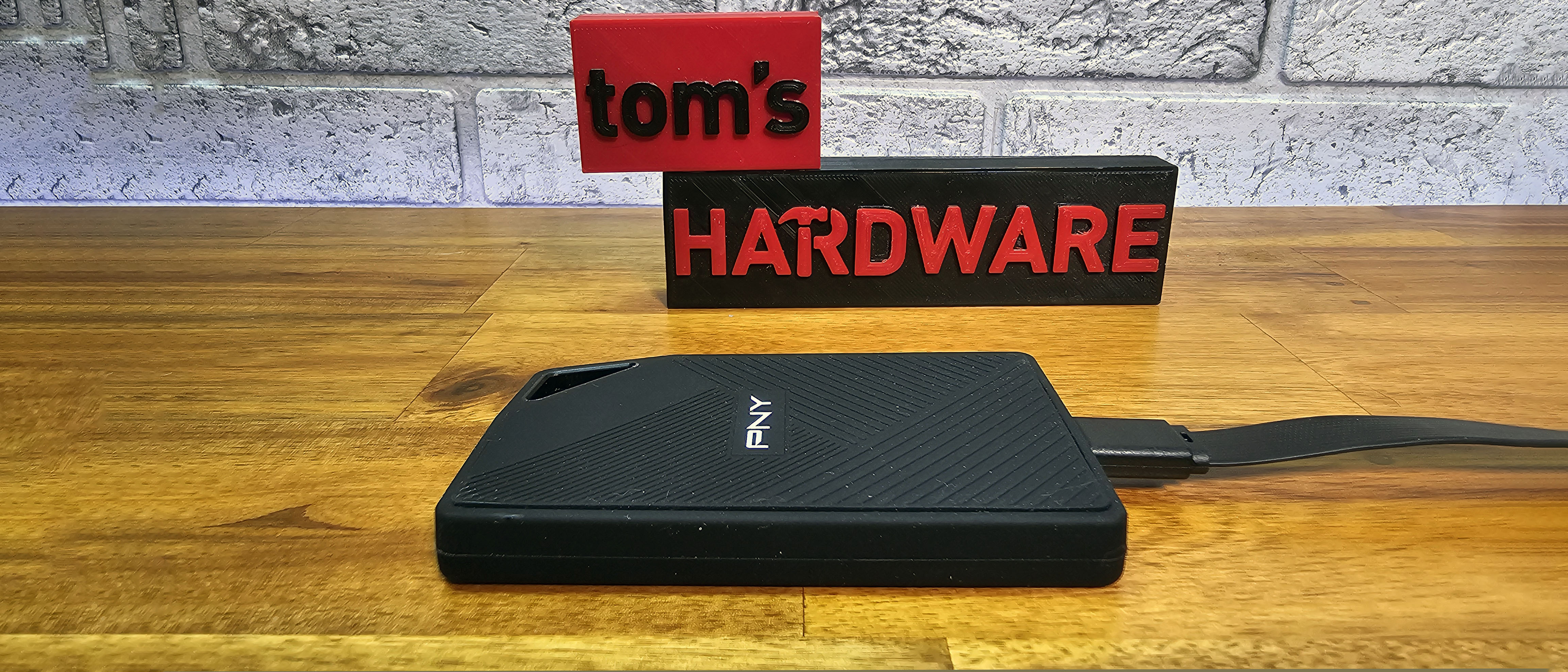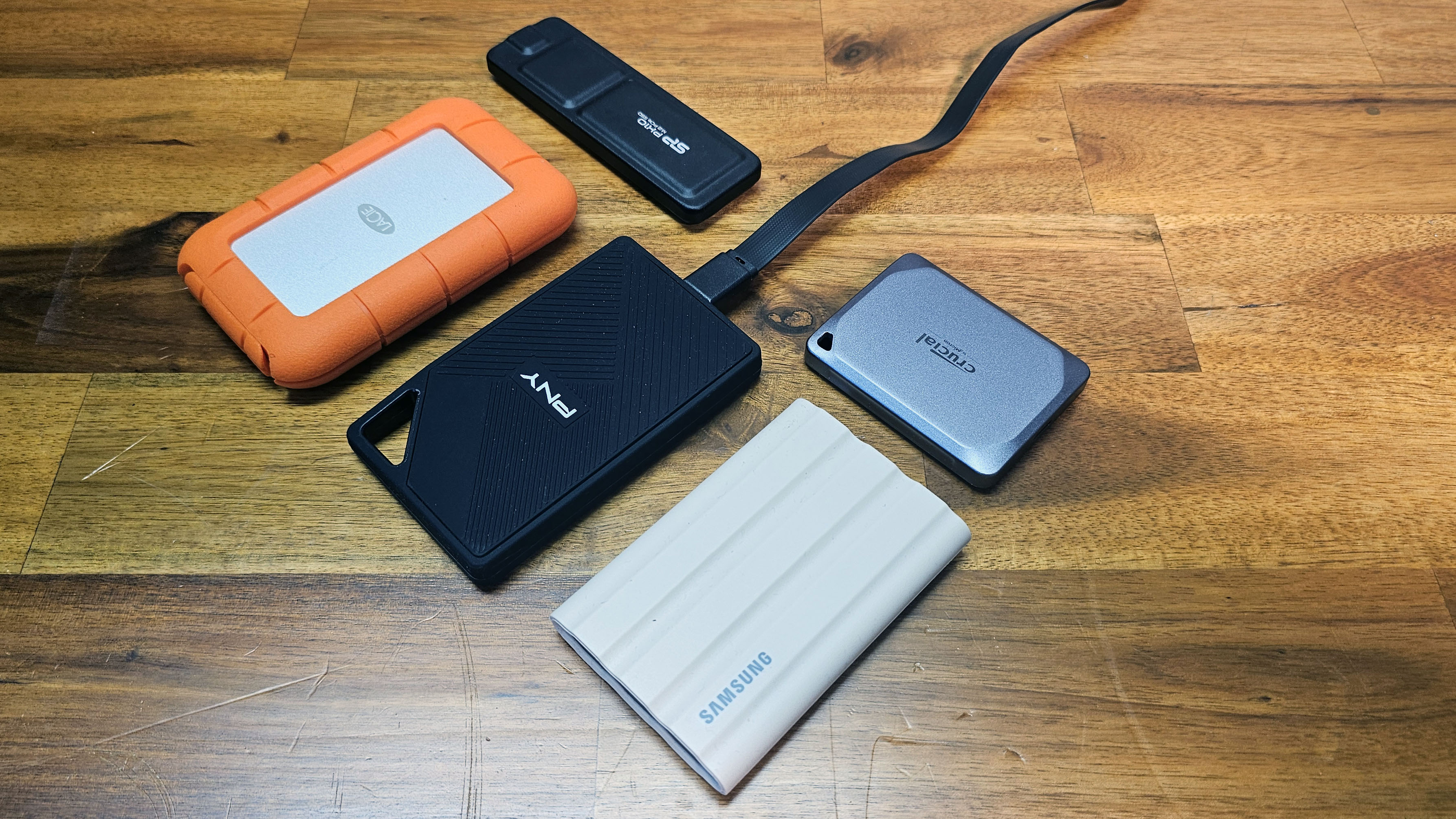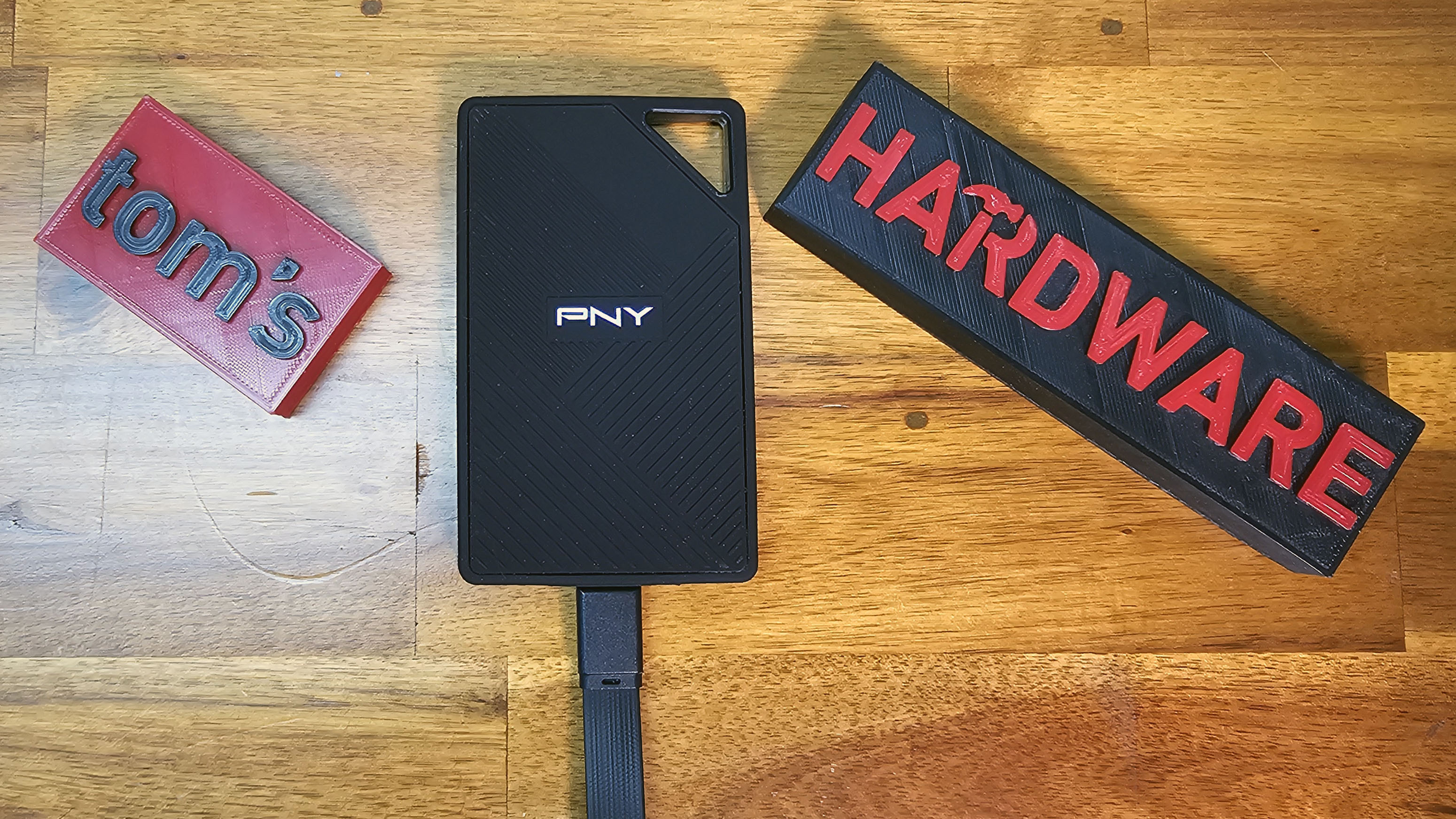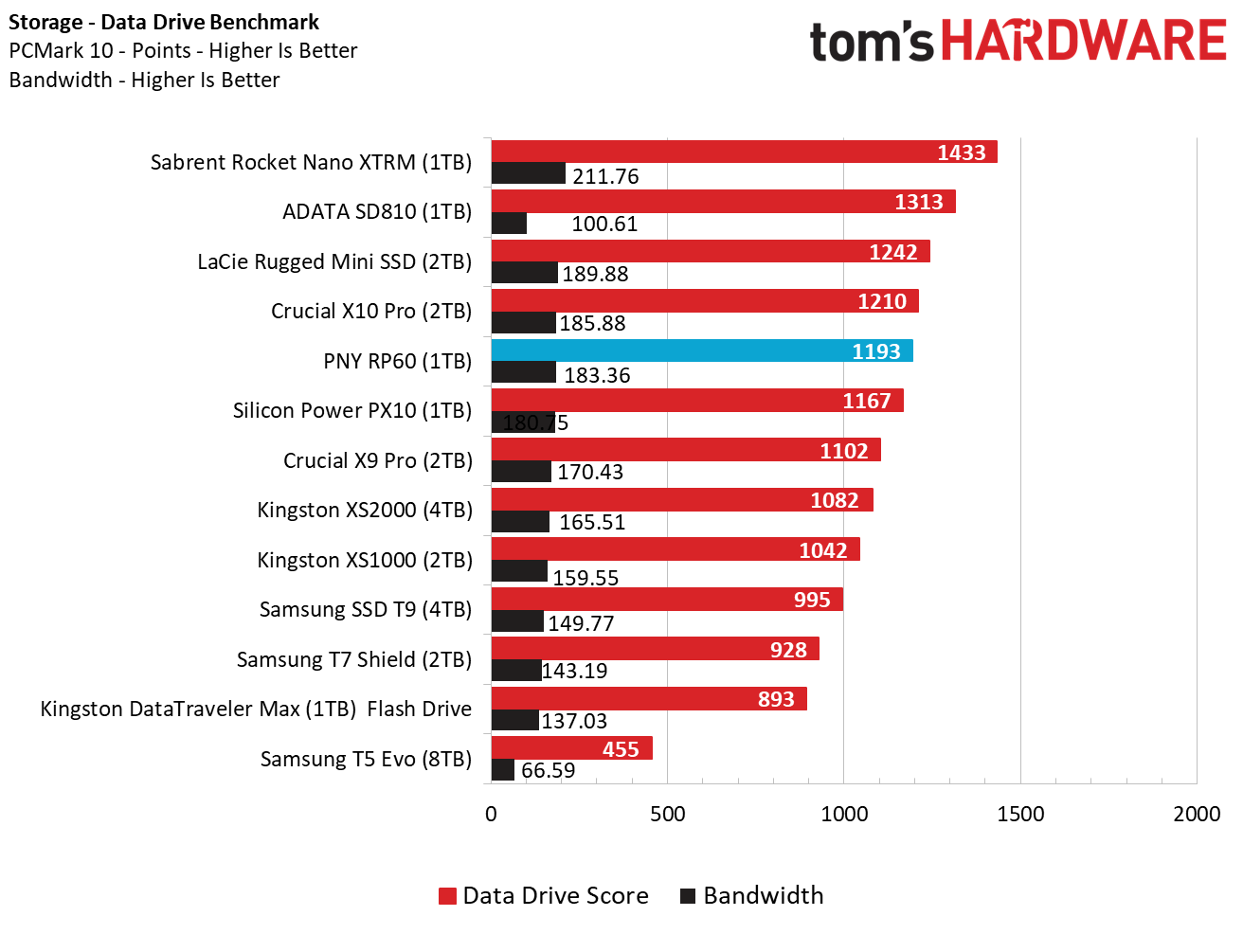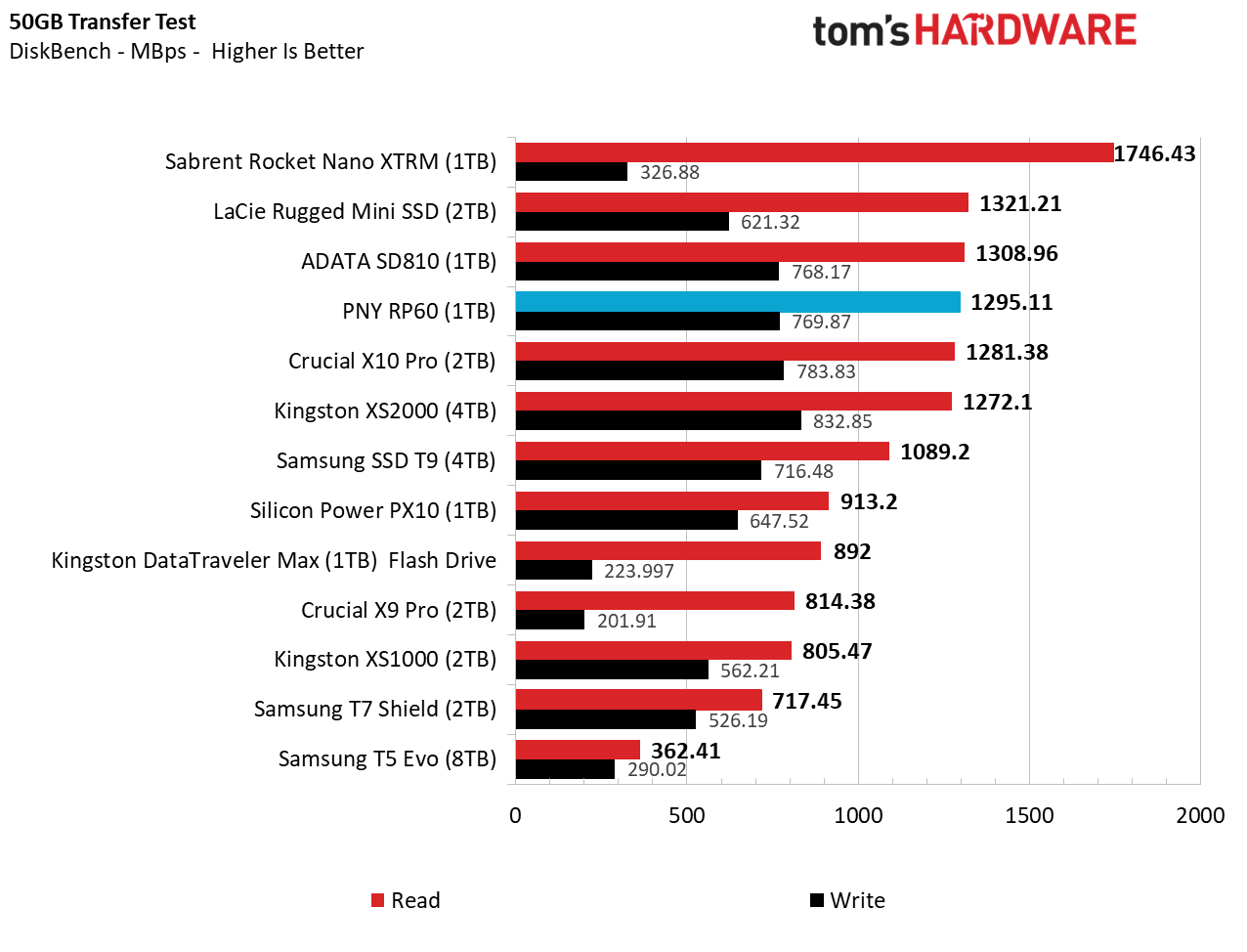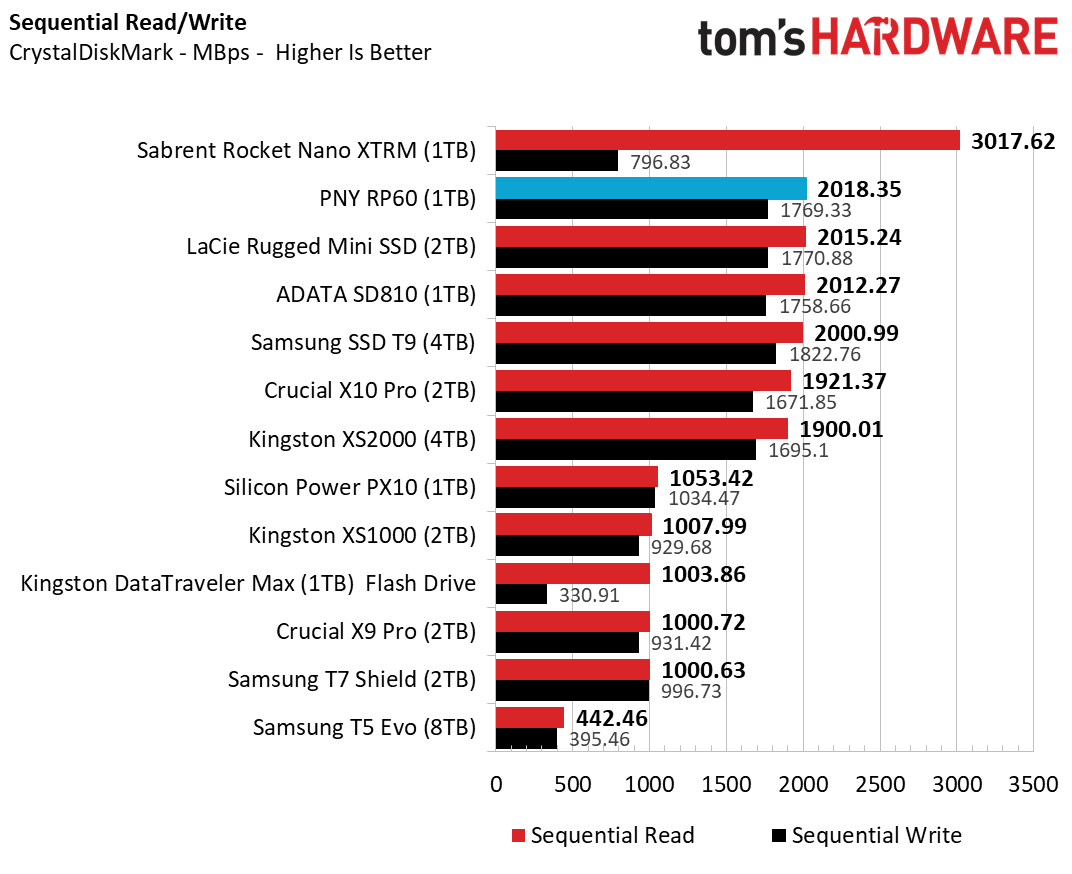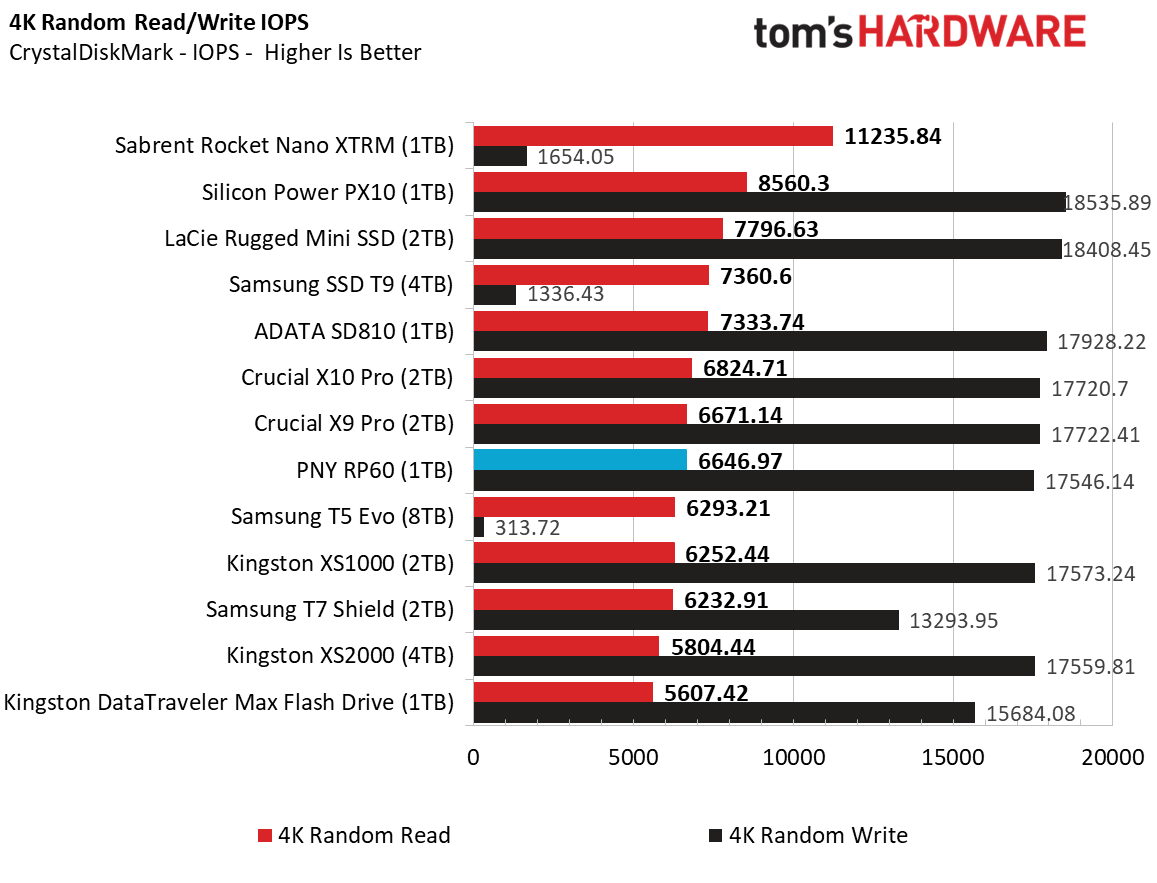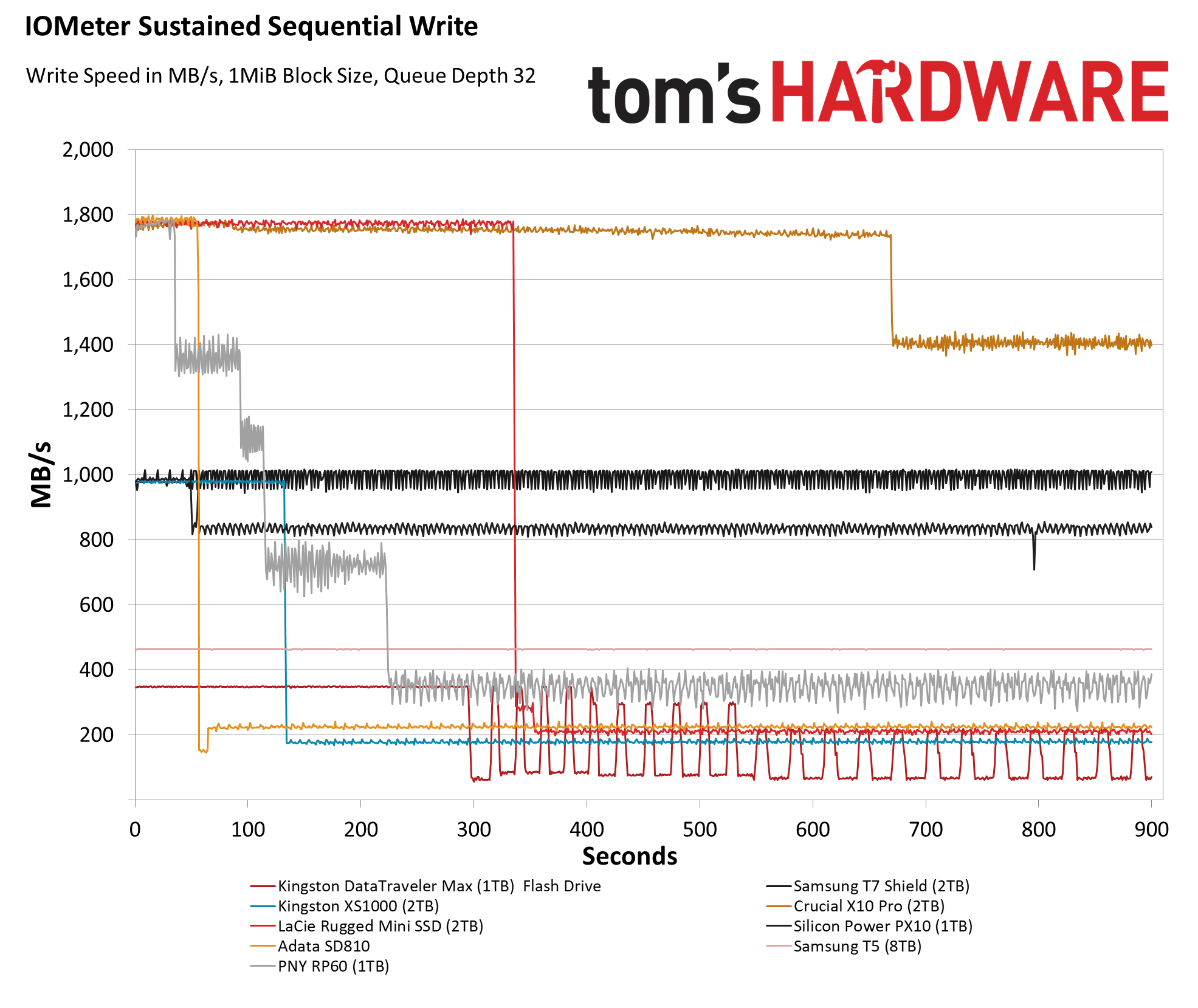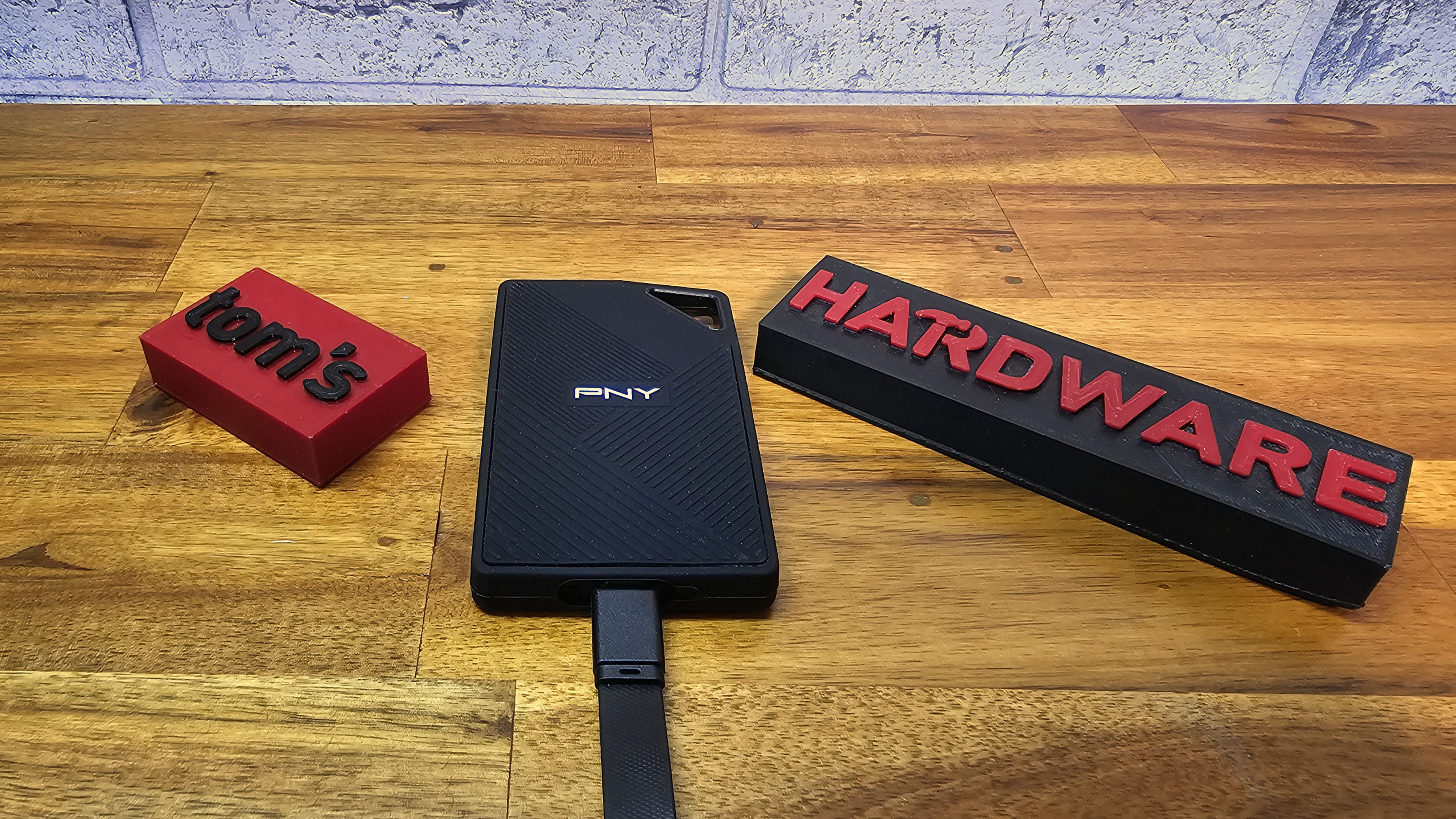Tom's Hardware Verdict
PNY's 20 Gbps rugged external drive performs well in bursty tasks, but doesn't handle sustained writes as well as competing drives that cost the same or less.
Pros
- +
Fast sequential performance
- +
Nice flat USB cable
Cons
- -
Lackluster sustained write performance
- -
Feels a bit light and flimsy
Why you can trust Tom's Hardware
Even though faster interfaces like USB4 and Thunderbolt 5 are here (to varying degrees), every storage company seems determined to release a 20 Gbps external SSD. And PNY is no exception, offering up its rubber-coated, flat-cabled RP60 in 1TB and 2TB capacities. Its exterior mimics the feel of drives like Samsung's T7 Shield, though its light 54-gram weight and some shell flex doesn't convey the same kind of ruggedness as other drives. It is, though, rated against water and dust (IP65) and accidental props of up to 3 meters. It also picks up all kinds of dust and pocket lint, just like Samsung's rubber-clad drives.
The RP60's performance is, for the most part, fairly good, particularly in our sequential read and write tests, where it put up some of the best results we've seen from a USB 3.2 Gen2 2x2 drive. That said, none of its performance truly stands out, unless you count our Iometer test, where we saw speeds drop by more than half in about 90 seconds, and eventually fall below 400 MBps.
That's far from the worst we've seen. And of course you have to hammer the drive with fast writes to get it to such a cache-saturated slow state, so many users might never see this issue. The problem is, at $99 for the 1TB model we tested and $179 for the top-capacity 2TB model, it's priced about the same or slightly more than Crucial's X10 Pro, which performs better overall, is much smaller, and feels more solidly built.
PNY RP60 specs
| Product | 1TB | 2TB |
| Pricing | $99.99 | $179.99 |
| Interface / Protocol | USB 3.2 Gen2 2x2 (20Gbps) | USB 3.2 Gen2 2x2 (20Gbps) |
| Included | Flat USB Type-C to Type-C cable | Flat USB Type-C to Type-C cable |
| Sequential Read | 2,000 MB/s | Up to 2,000 MB/s |
| Sequential Write | 1,800 MB/s | Up to 1,800 MB/s |
| Dimensions | 3.83 x 2.36 x 0.49 inches | 3.83 x 2.36 x 0.49 inches |
| Weight | 1.86 ounces (53 g) | 1.86 ounces (53 g) |
| Warranty | 3 years | 3 years |
Design and Accessories for the PNY RP60
At 3.83 x 2.36 x 0.49 inches and 53 grams (that's according to my coffee scale, as PNY doesn't list the drive's weight) and wrapped rubber with crisscrossing lines on the front, the RP60 is bigger than many recent drives, but it doesn't feel bulky. It does have a handy hole for clipping the drive to a bag or something else. Still, Crucial's X10 and X9 drives are about half this size, and feel more substantial with metal shells. The PNY drive's shell feels like plastic – especially on the top where there is some noticeable flex.
The PNY RP60 comes with a foot-long USB-C-to-USB-C cable that's wide and flat like a ribbon cable. I'm not sure if that's better than standard round cables. But at the very least, if you're swimming in an ocean of cables like I am, many of them lacking in bandwidth, it'll be easy to tell that this is the 20 Gbps cable that shipped with your SSD.
In terms of software, the drive ships with Acronis True Image, a solid drive backup mainstay that SanDisk also includes with its Desk Drive Desktop SSD. Not everyone wants or needs backup software (or any software) with their external storage. But what PNY provides is at least a decent choice that will be familiar to many enthusiasts and IT veterans.
Comparison Products
We've tested several 20 Gbps SSDs in recent months, including the budget-priced Adata SD810 and LaCie's bulky Rugged Mini SSD. But Crucial's X10 Pro is still our favorite USB 3.2 Gen2 2x2 drive, and it's currently selling for the same $99 for the 1TB capacity as PNY's drive. At the 2TB capacity, the X10 Pro sells for $5 less than the PNY drive ($174.99). Let's see how well PNY's RP60 stacks up to these and other recent external SSDs.
Trace Testing - PCMark 10 Storage Benchmark
PCMark 10 is a trace-based benchmark that uses a wide-ranging set of real-world traces from popular applications and everyday tasks to measure the performance of storage devices.
On this first test, the PNY RP60 turns in a decent showing, just behind Crucial's X10 Pro. LaCie's pricier drive does better, as does the cheaper ADATA SD810. And Sabrent's Thunderbolt Nano XTRM lands on top, thanks to its extra bandwidth.
Transfer Rates – DiskBench
We use the DiskBench storage benchmarking tool to test file transfer performance with a custom 50GB dataset. We copy 4,617 files (images, videos, and software ISO files) to a folder on the test drive (write). Then, after leaving the system idle for five minutes, we run the same test in reverse, moving the test folder to a different location on our PCIe 4.0 testing drive.
Get Tom's Hardware's best news and in-depth reviews, straight to your inbox.
Things look a little better for the PNY drive in our real-world file transfer test, where its read speed of 1295 MBps puts it slightly ahead of the Crucial drive, though its write speed is somewhat slower than Crucial's result. Once again, the LaCie and ADATA drives both do better here.
Synthetic Testing CrystalDiskMark
CrystalDiskMark (CDM) is a free and easy-to-run storage benchmarking tool that SSD companies commonly use to assign performance specifications to their products. It gives us insight into how each device handles different file sizes. We run this test at its default settings.
Here, the PNY RP60 looks its best, landing in second place overall in reads writes, while the Crucial drive is noticeably slower.
When it comes to random writes/IOPS, PNY's drive returns to its spot just below the Crucial X10 Pro (and the X9 Pro), and neither of those drives are close to the top of this chart. The budget-priced Silicon Power PX10 stands out here, beating the LaCie drive that costs much more.
Sustained Write Performance
A drive's rated write specifications are only a piece of the performance picture. Most external SSDs (just like their internal counterparts) implement a write cache, or a fast area of flash, programmed to perform like faster SLC, that absorbs incoming data. Sustained write speeds often suffer tremendously when the workload saturates the cache and slips into the "native" TLC or QLC flash. We use Iometer to hammer the SSD with sequential writes for 15 minutes to measure both the size of the write cache and performance after the cache is saturated.
This is the most grueling of our storage benchmarks, and the one most important for creative professionals who move lots of data. Here, the Crucial X10 Pro was able to deliver write speeds above 1700 MBps for about 11 minutes. And the PNY? As you can see from its gray line, it only maintained that speed for roughly 30 seconds, before dropping into the 1400 MBps range, then below 1200 MBps, then to 800 MBps, before finally settling in at a steady sub-400 MBps after about four minutes.
Again, not everyone needs this level of sustained speedy write speeds. After all, you could transfer quite a bit of data in the 90 seconds or so that the PNY drive maintains write speeds above 1,000 MBps in this test. And if your source drive isn't as fast as the PNY drive, you may not see this kind of slowdown at all. But considering Crucial's X10 Pro is about as fast in most other tests and much speedier in sustained performance, for about the same price or less, it's tough to argue for the PNY RP60, at least at its current price.
Conclusion
PNY's RP60 portable SSD delivers very good sequential performance in most of our benchmarks, sports an interesting flat USB cable, and ships with Acronis True Image, which is handy for backups and drive cloning. But at its current price of $99 (1TB) and $179 (2TB), it's tough to recommend given its flimsy-feeling build quality and poor sustained write speeds compared to the similarly priced Crucial X10 Pro. The Crucial drive is also about half the size of the PNY, is lighter , and feels much more solid.
MORE: Best SSDs
MORE: Best Hard Drive
MORE: Best External SSDs
After a rough start with the Mattel Aquarius as a child, Matt built his first PC in the late 1990s and ventured into mild PC modding in the early 2000s. He’s spent the last 15 years covering emerging technology for Smithsonian, Popular Science, and Consumer Reports, while testing components and PCs for Computer Shopper, PCMag and Digital Trends.
